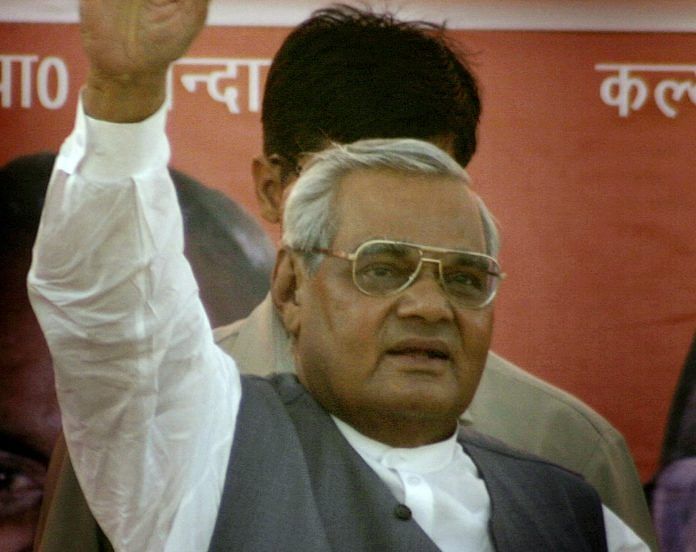Kingshuk Nag in his book, Atal Bihari Vajpayee: A Man For All Seasons, writes how Vajpayee saw through Sudarshan’s plots and conservative politics.
On the eve of the formation of his ministry in March 1998, Atal had a surprise midnight visitor. It was K.S. Sudarshan, the number two person in the RSS. Though the exact details of the conversation that night between Atal and Sudarshan are not known, the latter told the prime minister to keep Jaswant Singh out of the cabinet that was being formed. Jaswant had been the finance minister in Atal’s thirteen-day ministry in 1996, and was widely expected to be appointed as the custodian of the important ministry headquartered in central secretariat’s North Block once again. Sudarshan’s logic was that Jaswant had lost the just-concluded elections, and it was not in the right democratic spirit to appoint him a minister. Atal was a little flummoxed and annoyed too, if insiders are to be believed. However, he fell in line with the diktat from the RSS. The next day, when the cabinet was announced, the name of Jaswant Singh was missing from the list, sparking widespread speculation. Insiders say that the RSS had reservations about Jaswant Singh because he was an outsider. In a BJP that was full of RSS men seconded to the political party, the former army major who had been to the elite Mayo College in Ajmer was an exception. Jaswant Singh had never been in the RSS. In the corridors of the BJP’s Ashoka Road office, there was a lot of gossip about Jaswant’s lifestyle which was far from being spartan and there were allegations floating about how he was close to a particular business house. Nothing was proven, but obviously Nagpur had harped on his failure to win the Lok Sabha polls to ensure that he did not make the ministerial grade.
Atal was not a man to take things lying down, and he appointed Jaswant Singh as the deputy chairman of the Planning Commission within days and got him elected to the Rajya Sabha in July 1998. A few months later, in December, Jaswant was inducted into the cabinet, but as defence minister. Some years later, in 2002, he was made finance minister.
Although Sudarshan is believed to have used the name of RSS sarsanghchalak Rajendra Singh to put forward the ‘request’ to deny Jaswant a cabinet berth, Atal instinctively knew that it was Sudarshan’s own ploy. He knew that Sudarshan had convinced the RSS top boss to issue a diktat. From that day, Atal made strenuous efforts to keep Sudarshan at bay. Atal had good relations with Rajendra Singh, going beyond the fact that both belonged to the cow-belt. Rajendra Singh, who was only three years older than Atal, had been acquainted with the latter since the mid-1940s. Rajendra Singh, a former professor of physics at Allahabad University and the first non-Brahmin to head the RSS, held Atal—and more so, ‘Brand Atal’—in high regard. Atal knew that if Rajendra Singh continued as RSS sarsanghchalak, he would manage the BJP government’s relationship with Nagpur quite well. However, Rajendra Singh, better known as Rajju bhaiyya, had expressed his desire to step down because of bad health and pass on the mantle to Sudarshan. There was a more senior contender, H.V. Seshadri, but he was suffering from a heart ailment. Atal was apprehensive of Sudarshan, a Kannadiga who had grown up in Chattisgarh’s (formerly a part of Madhya Pradesh) Raipur region. Sudarshan was too conservative and propagated the cause of swadeshi at a time when the economy was being freed. In fact, Atal held that Sudarshan’s reservations about Jaswant as finance minister also stemmed from the fact that the latter was seen as a liberalizer. According to Hindutva expert Jyotirmaya Sharma, Atal spent the next two years convincing Rajendra Singh that he continue and not step down. In this endeavour, he pressed even his colleague L.K. Advani into service, Sharma claims. But in March 2000, Rajendra Singh ultimately stepped down, his health deteriorating. Sudarshan took over and for the next two years, till the Gujarat riots happened, Atal kept the new sarsanghchalak at bay. To all his requests Atal told Sudarshan that he would have been happy to oblige, but for the fact that the government that he headed was not a BJP but an NDA dispensation and there was no way that the alliance partners would agree.
‘Advani, at the behest of Atal, would invite Sudarshan and his colleague M.G. Vaidya to dinner at home and convince them how what they were seeking was impossible to do,’ says Sharma.
Excerpted with permission from Rupa Publications.



